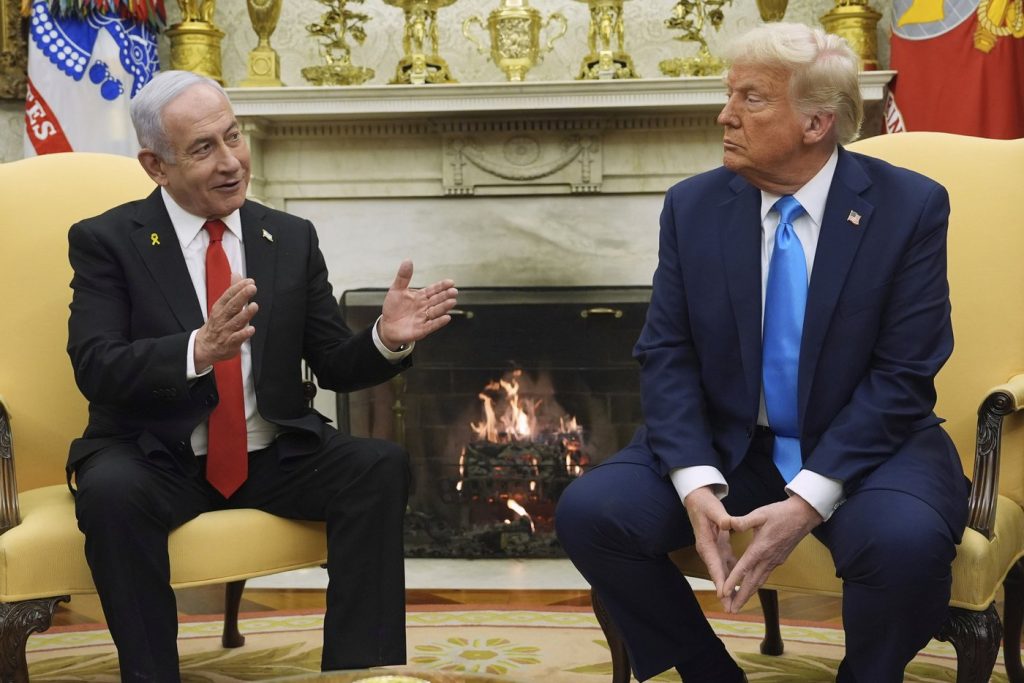PALM BEACH GARDENS, Fla. - President Donald Trump is set to meet with Israeli Prime Minister Benjamin Netanyahu on Monday, marking their second official meeting at the White House since Trump's return to office. This visit comes amidst heightened tensions as Israel establishes a new security corridor across Gaza to exert pressure on Hamas. Recent Israeli airstrikes resulted in the deaths of more than a dozen individuals in Gaza, following an earlier incident that claimed at least 100 Palestinian lives.
In the past two weeks, hundreds more have been killed as Israel intensifies operations aimed at forcing Hamas to release remaining hostages taken during the militant group's attacks on Israel in October 2023. Israel has vowed to escalate military actions until Hamas returns the hostages, disarms, and exits the territory. A ceasefire was ended by Israel in March, leading to a blockade that halts all imports of food, fuel, and humanitarian aid into Gaza.
The upcoming meeting between Trump and Netanyahu is expected to address the ongoing Israeli bombardment of Gaza as well as new tariffs announced by Trump targeting Israel and other nations. Trump's first diplomatic invitation of his second term was extended to Netanyahu, with their initial meeting on February 4 focusing on the war with Hamas and subsequent developments resulting from a temporary ceasefire.
During the February meeting, Trump proposed that displaced Palestinians be permanently resettled outside Gaza, suggesting U.S. "ownership" in redeveloping the area into a desirable location termed "the Riviera of the Middle East." This proposal faced backlash from Palestinians, Arab nations, and rights organizations, leading to criticism regarding the potential displacement of Gazans.
Last month, Israel violated a ceasefire agreement with a surprise attack on Gaza while attempting to compel Hamas to accept new terms for a ceasefire, a move the White House backed. This meeting is seen as a crucial opportunity for Netanyahu to reinforce the abstract support from the Trump administration, while also diverting attention from domestic political pressures, which have grown due to ongoing protests related to hostages and governmental accountability.
Relatives of hostages held in Gaza have publicly urged Trump to exert pressure on Netanyahu to end the ongoing conflict and secure the return of their loved ones. Ifat Calderon, the aunt of hostage Ofer Calderon, criticized Netanyahu's claims that military action would facilitate the return of hostages, arguing that ending the war would ensure their swift release. Currently, Hamas is demanding the release of Palestinian prisoners and a long-term ceasefire in exchange for the 59 hostages they still hold.
The initial Hamas-led assault on Israel resulted in approximately 1,200 deaths, predominantly among civilians, and included the taking of 251 hostages, most of whom have been released through ceasefire negotiations. In Gaza, the ongoing Israeli offensive has been reported to have resulted in over 50,000 Palestinian casualties, though the Health Ministry does not specify the number of combatants versus civilians killed. Israel claims to have killed around 20,000 militants but has not provided evidence to support these figures.
Compounding Netanyahu's challenges, he faces legal issues including a corruption trial and an ongoing investigation into the alleged acceptance of bribes linked to Qatar's influence in Israel. This week, police detained two of his associates on suspicion of taking money from Qatar to enhance the Gulf nation's image domestically. Despite these allegations, Netanyahu maintains that the accusations are unfounded.
Looking ahead, Trump has announced that the first international trip of his administration will involve stops in Saudi Arabia, Qatar, and potentially the United Arab Emirates, with a focus on fostering economic ties. The trip could occur as early as May and is intended to recognize Saudi investments in the United States and secure commitments from the Gulf states to create jobs in the U.S.










